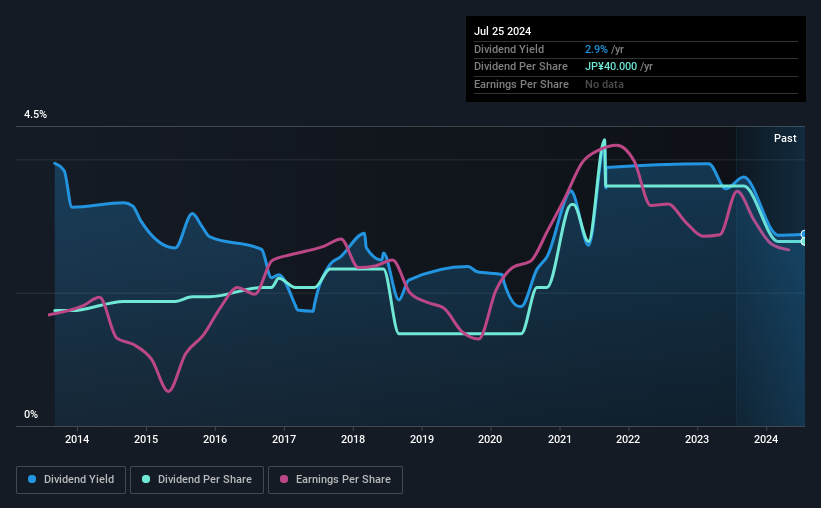Stock Analysis
- Japan
- /
- Specialty Stores
- /
- TSE:3172
Be Sure To Check Out Tea Life Co., Ltd. (TSE:3172) Before It Goes Ex-Dividend

It looks like Tea Life Co., Ltd. (TSE:3172) is about to go ex-dividend in the next 3 days. Typically, the ex-dividend date is one business day before the record date which is the date on which a company determines the shareholders eligible to receive a dividend. The ex-dividend date is of consequence because whenever a stock is bought or sold, the trade takes at least two business day to settle. Thus, you can purchase Tea Life's shares before the 30th of July in order to receive the dividend, which the company will pay on the 30th of October.
The company's next dividend payment will be JP¥20.00 per share. Last year, in total, the company distributed JP¥40.00 to shareholders. Calculating the last year's worth of payments shows that Tea Life has a trailing yield of 2.9% on the current share price of JP¥1390.00. We love seeing companies pay a dividend, but it's also important to be sure that laying the golden eggs isn't going to kill our golden goose! So we need to investigate whether Tea Life can afford its dividend, and if the dividend could grow.
Check out our latest analysis for Tea Life
Dividends are usually paid out of company profits, so if a company pays out more than it earned then its dividend is usually at greater risk of being cut. Tea Life has a low and conservative payout ratio of just 25% of its income after tax. A useful secondary check can be to evaluate whether Tea Life generated enough free cash flow to afford its dividend. Fortunately, it paid out only 42% of its free cash flow in the past year.
It's positive to see that Tea Life's dividend is covered by both profits and cash flow, since this is generally a sign that the dividend is sustainable, and a lower payout ratio usually suggests a greater margin of safety before the dividend gets cut.
Click here to see how much of its profit Tea Life paid out over the last 12 months.

Have Earnings And Dividends Been Growing?
Stocks with flat earnings can still be attractive dividend payers, but it is important to be more conservative with your approach and demand a greater margin for safety when it comes to dividend sustainability. Investors love dividends, so if earnings fall and the dividend is reduced, expect a stock to be sold off heavily at the same time. With that in mind, we're not enthused to see that Tea Life's earnings per share have remained effectively flat over the past five years. Better than seeing them fall off a cliff, for sure, but the best dividend stocks grow their earnings meaningfully over the long run. Recent earnings growth has been limited. Yet there are several ways to grow the dividend, and one of them is simply that the company may choose to pay out more of its earnings as dividends.
The main way most investors will assess a company's dividend prospects is by checking the historical rate of dividend growth. Tea Life has delivered an average of 4.8% per year annual increase in its dividend, based on the past 10 years of dividend payments.
Final Takeaway
Has Tea Life got what it takes to maintain its dividend payments? Earnings per share have been flat over this time, but we're intrigued to see that Tea Life is paying out less than half its earnings and cash flow as dividends. This is interesting for a few reasons, as it suggests management may be reinvesting heavily in the business, but it also provides room to increase the dividend in time. We would prefer to see earnings growing faster, but the best dividend stocks over the long term typically combine strong earnings per share growth with a low payout ratio, and Tea Life is halfway there. There's a lot to like about Tea Life, and we would prioritise taking a closer look at it.
In light of that, while Tea Life has an appealing dividend, it's worth knowing the risks involved with this stock. Case in point: We've spotted 2 warning signs for Tea Life you should be aware of.
A common investing mistake is buying the first interesting stock you see. Here you can find a full list of high-yield dividend stocks.
Valuation is complex, but we're here to simplify it.
Discover if Tea Life might be undervalued or overvalued with our detailed analysis, featuring fair value estimates, potential risks, dividends, insider trades, and its financial condition.
Access Free AnalysisHave feedback on this article? Concerned about the content? Get in touch with us directly. Alternatively, email editorial-team (at) simplywallst.com.
This article by Simply Wall St is general in nature. We provide commentary based on historical data and analyst forecasts only using an unbiased methodology and our articles are not intended to be financial advice. It does not constitute a recommendation to buy or sell any stock, and does not take account of your objectives, or your financial situation. We aim to bring you long-term focused analysis driven by fundamental data. Note that our analysis may not factor in the latest price-sensitive company announcements or qualitative material. Simply Wall St has no position in any stocks mentioned.
Have feedback on this article? Concerned about the content? Get in touch with us directly. Alternatively, email editorial-team@simplywallst.com
About TSE:3172
Tea Life
Engages in the Internet and catalog sale of health tea, health foods, cosmetics, medicines, etc.
Excellent balance sheet average dividend payer.

